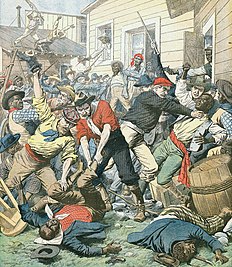This article needs additional citations for verification. (March 2023) |
Redeemers | |
|---|---|
| Prominent members | Wade Hampton III Benjamin Tillman Alcibiades DeBlanc Murphy J. Foster Isham G. Harris Lucius Quintus Cincinnatus Lamar |
| Associated paramilitaries | Ku Klux Klan White League Red Shirts Knights of the White Camelia |
| Founded | 1865 |
| Dissolved | 1877 |
| Preceded by | Southern Democrats |
| Merged into | Southern Democrats • Solid South / Southern Bloc |
| Ideology | White supremacy Anti-Reconstruction Segregationism |
| Religion | Protestantism |
| National affiliation | Democratic Party • Southern Democrats |
| Part of a series on the |
| Nadir of American race relations |
|---|
 |
The Redeemers were a political coalition in the Southern United States during the Reconstruction Era that followed the American Civil War. Redeemers were the Southern wing of the Democratic Party. They sought to regain their political power and enforce White supremacy. Their policy of Redemption was intended to oust the Radical Republicans, a coalition of freedmen, "carpetbaggers", and "scalawags". They were typically led by White yeomen[citation needed] and dominated Southern politics in most areas from the 1870s to 1910.
During Reconstruction, the South was under occupation by federal forces, and Southern state governments were dominated by Republicans, elected largely by freedmen and allies. Republicans nationally pressed for the granting of political rights to the newly freed slaves as the key to their becoming full citizens and the votes they would cast for the party. The Thirteenth Amendment (banning slavery), Fourteenth Amendment (guaranteeing the civil rights of former slaves and ensuring equal protection of the laws), and Fifteenth Amendment (prohibiting the denial of the right to vote on grounds of race, color, or previous condition of servitude), enshrined such political rights in the Constitution.
Numerous educated blacks moved to the South to work for Reconstruction. Some were elected to office in the Southern states, or were appointed to positions. The Reconstruction governments were unpopular with many White Southerners, who were not willing to accept defeat and continued to try to prevent black political activity by any means. While the elite planter class often supported insurgencies, violence against freedmen and other Republicans was usually carried out by non-elite Whites.[citation needed] The secret Ku Klux Klan chapters developed in the first years after the war as one form of insurgency.
In the 1870s, paramilitary organizations, such as the White League in Louisiana and Red Shirts in Mississippi and North Carolina, undermined the Republicans, disrupting meetings and political gatherings. These paramilitary bands also used violence and threats of violence to undermine the Republican vote. By the presidential election of 1876, only three Southern states – Louisiana, South Carolina, and Florida – were "unredeemed," or not yet taken over by White Democrats. The disputed Presidential election between Rutherford B. Hayes (the Republican governor of Ohio) and Samuel J. Tilden (the Democratic governor of New York) was allegedly resolved by the Compromise of 1877, also known as the Corrupt Bargain or the Bargain of 1877.[1] In this compromise, it was claimed, Hayes became president in exchange for numerous favors to the South, one of which was the removal of Federal troops from the remaining "unredeemed" Southern states; this was however a policy Hayes had endorsed during his campaign. With the removal of these forces, Reconstruction came to an end.
- ^ Wes Allison, "Election 2000 much like Election 1876" Archived 2011-08-07 at the Wayback Machine, St. Petersburg Times, November 17, 2000.
© MMXXIII Rich X Search. We shall prevail. All rights reserved. Rich X Search
